 Remember when Joshua Burnside put out a momentous album last year and we wondered how cool it would be if we ever witnessed it live? Well, here’s the time. It’s the first of three sold-out nights at the Sports Club, as Belfast gets weirdly to terms with unchecked, unmasked gigs in tight proximity to mates and musicians.
Remember when Joshua Burnside put out a momentous album last year and we wondered how cool it would be if we ever witnessed it live? Well, here’s the time. It’s the first of three sold-out nights at the Sports Club, as Belfast gets weirdly to terms with unchecked, unmasked gigs in tight proximity to mates and musicians.
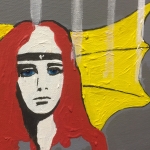 The cover is a painting of prog-rock era Peter Gabriel, imagined by Britpop misanthropist Luke Haines. The record is made in Derry by an established, Anglo blow-in. The songs are furious in parts but mostly peeved and petulant. They seem to be sited in some wind-lashed, provincial sinkhole, frequented by ruffians, poseurs and bald adolescents. Welcome back, Invaderband with your new streak of slanted, declamatory stuff.
The cover is a painting of prog-rock era Peter Gabriel, imagined by Britpop misanthropist Luke Haines. The record is made in Derry by an established, Anglo blow-in. The songs are furious in parts but mostly peeved and petulant. They seem to be sited in some wind-lashed, provincial sinkhole, frequented by ruffians, poseurs and bald adolescents. Welcome back, Invaderband with your new streak of slanted, declamatory stuff.
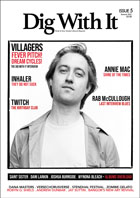 We meet in a park on the south side of Dublin Bay. The clouds are up and we talk loosely about band rehearsals, bicycle maintenance and the joy that a teenage Conor J. O’Brien once found in a new Radiohead release, saving up his first listen of Kid A for the morning before school.
We meet in a park on the south side of Dublin Bay. The clouds are up and we talk loosely about band rehearsals, bicycle maintenance and the joy that a teenage Conor J. O’Brien once found in a new Radiohead release, saving up his first listen of Kid A for the morning before school.
He chats about life drawing classes in Berlin, which he follows online, organised by Dave Hedderman, his old bandmate from the days of The Immediate. Conor’s drawings, at least the ones he shares with us, are vivid and peculiar, something we might discuss later. But like his music, they suggest turbulence versus order, some reassuring details in the face of the unknown.
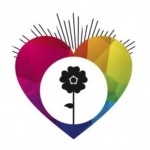 Three festival events in three months – Stendhal have kept the nerves steady and made a momentous case for music, camping and people getting delighted, outdoors. From a trial gig in June and then a couple of roaring days in July, the ultimate was always a showdown in August with multiple live stages, 5,000 visitors and a tenth birthday party of jubilant proportions.
Three festival events in three months – Stendhal have kept the nerves steady and made a momentous case for music, camping and people getting delighted, outdoors. From a trial gig in June and then a couple of roaring days in July, the ultimate was always a showdown in August with multiple live stages, 5,000 visitors and a tenth birthday party of jubilant proportions.
 Parkside Grooming is an animal-primping business near Wanstead Flats in East London. If you pet can fit in the big bath, then it it’s good to groom. Alternately, ‘Parkside Grooming’ is an EP by Lou Price. He’s still a feature with the band Swimming Tapes and he had previous form with a fine act from Bangor called Kowalski. He’s just made this lovely collection of tunes that tends towards melancholia. It features sweet, chiming guitar to please Johnny Marr fans plus surprise chord moves.
Parkside Grooming is an animal-primping business near Wanstead Flats in East London. If you pet can fit in the big bath, then it it’s good to groom. Alternately, ‘Parkside Grooming’ is an EP by Lou Price. He’s still a feature with the band Swimming Tapes and he had previous form with a fine act from Bangor called Kowalski. He’s just made this lovely collection of tunes that tends towards melancholia. It features sweet, chiming guitar to please Johnny Marr fans plus surprise chord moves.
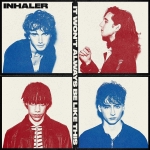 Ryan McMahon has the best lockdown hair in Inhaler. Lank yet a bit elegant. Ryan doesn’t speak that often but when he does, it’s cool and declarative. No confidence issues with the guy. He’s not like the drummers you often meet. And now he’s about to lean forward on the sofa, centre-left of the band formation and he’s going to say stuff about the new record that will cause his colleagues to laugh, at the loose audacity of it all.
Ryan McMahon has the best lockdown hair in Inhaler. Lank yet a bit elegant. Ryan doesn’t speak that often but when he does, it’s cool and declarative. No confidence issues with the guy. He’s not like the drummers you often meet. And now he’s about to lean forward on the sofa, centre-left of the band formation and he’s going to say stuff about the new record that will cause his colleagues to laugh, at the loose audacity of it all.
 We see New Pagans on Day Two of Stendhal. They play ‘It’s Darker’ as the temperature drops. And then the festival thing happens, when a big stage and a keen audience connect with music that’s ready to assume gigantic proportions.
We see New Pagans on Day Two of Stendhal. They play ‘It’s Darker’ as the temperature drops. And then the festival thing happens, when a big stage and a keen audience connect with music that’s ready to assume gigantic proportions.
You might well know the song already. ‘It’s Darker’ is righteously upset about a put-down at a party. It rages about the discourse of the nasty. And it wins, because New Pagans are opposed to the snide remark, the reductive thought and the way of the bigot. They respond with noise and intelligence. It’s the greatest roar, a denial of darkness.
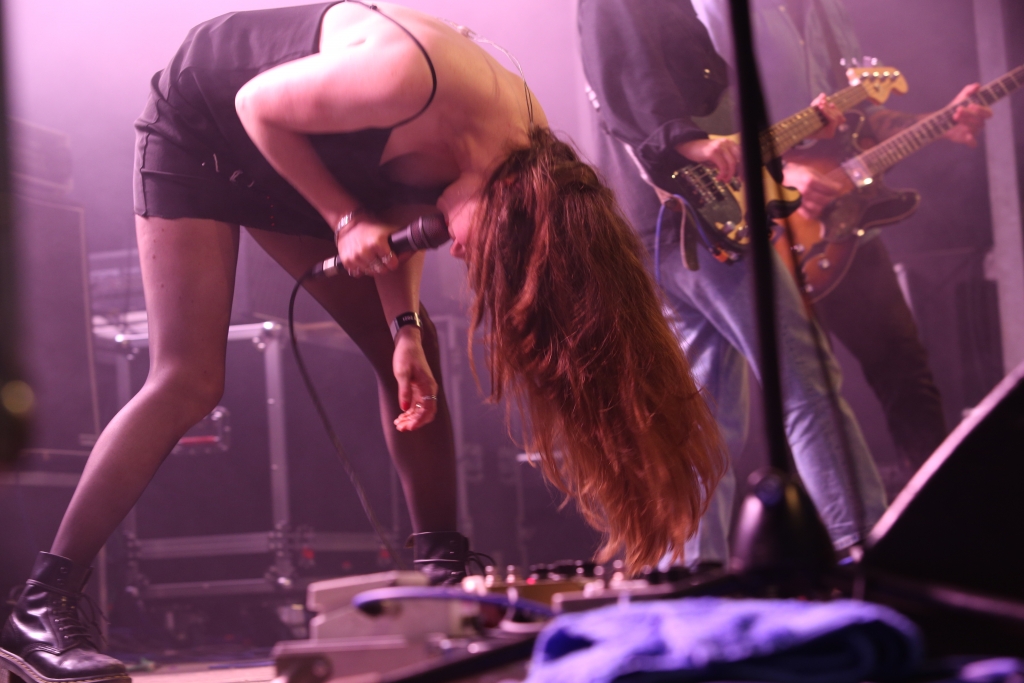 We have little time to absorb all this because now they are playing ‘Lily Yeats’ and Lyndsey is fixing on another troublesome issue – the relegation of female artists, the write-offs and the repression. Again, the volume rises and although the players may look nonchalant, they are acutely in synch. Those guitar crunches plus the stop-time and the moments when everything flies at once – none of this is accidental.
We have little time to absorb all this because now they are playing ‘Lily Yeats’ and Lyndsey is fixing on another troublesome issue – the relegation of female artists, the write-offs and the repression. Again, the volume rises and although the players may look nonchalant, they are acutely in synch. Those guitar crunches plus the stop-time and the moments when everything flies at once – none of this is accidental.
Therefore Lyndsey is secure with the band and it allows her the liberty to inhabit every microsecond. She sings in the present and relives the outrage. Importantly, because she grew up in a home where popular music wasn’t condoned, she came late to the tunes and isn’t bound by the grammar book of rock moves. It’s all fresh and astonishing.
‘Christian Boys’ is the greatest song of the night. It pivots halfway through as if any proper consideration is wasted on these loathsome figures. And so New Pagans summon up the bulldozers and they do the demolition. Lyndsey folds herself on the floor by the bass drum. There’s no why. It’s just pure feeling, foetal attraction. Such an event.
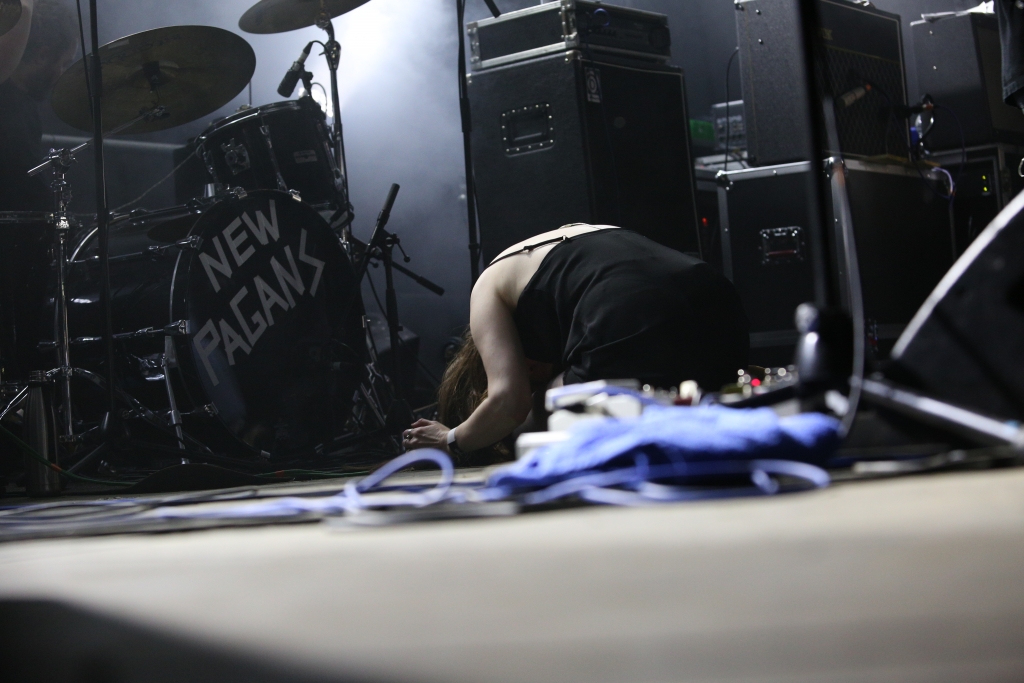 The Saturday plans for Stendhal have also gifted us the lightness of Laytha, two sure voices on ‘What Will I Gain’. The song considers family, hopes and a place to belong. Dolores O’Riordan is smiling, somewhere. Another tune, ‘Strawberry Moon’ was completed after a drink-fuelled Zoom quiz but you might believe that it came from a lakeside walk by Windermere. Laytha also support the Free Britney movement by playing ‘Oops!… I Did It Again’, with feeling.
The Saturday plans for Stendhal have also gifted us the lightness of Laytha, two sure voices on ‘What Will I Gain’. The song considers family, hopes and a place to belong. Dolores O’Riordan is smiling, somewhere. Another tune, ‘Strawberry Moon’ was completed after a drink-fuelled Zoom quiz but you might believe that it came from a lakeside walk by Windermere. Laytha also support the Free Britney movement by playing ‘Oops!… I Did It Again’, with feeling.
Cherym put down vital songs at the get-go like the best poker sharks. No reason to deny ‘Listening to my Head’, ‘Take it Back’, ‘Pretty Boys’ and ‘Telepathic Kelly’. They provide the jokes, the hair and the commentary. As with many bands, there is a slight wobble at the start, like an ex-cyclist returning to the saddle. Eighteen months off, y’know. And then it rolls on, headed for glory.
Sasha Samara does the Wooly Woodland Stage in a taffeta ball gown and hiking boots. All contingencies are covered. The uke sounds deadly and there’s a transformational air about Sasha’s style. She’s no longer regretful and apologetic. The daisy-shaped guitar goes out of tune but it does not detract. She jokes plenty and ‘Sobering Up’ is a throwback to more troubled times.
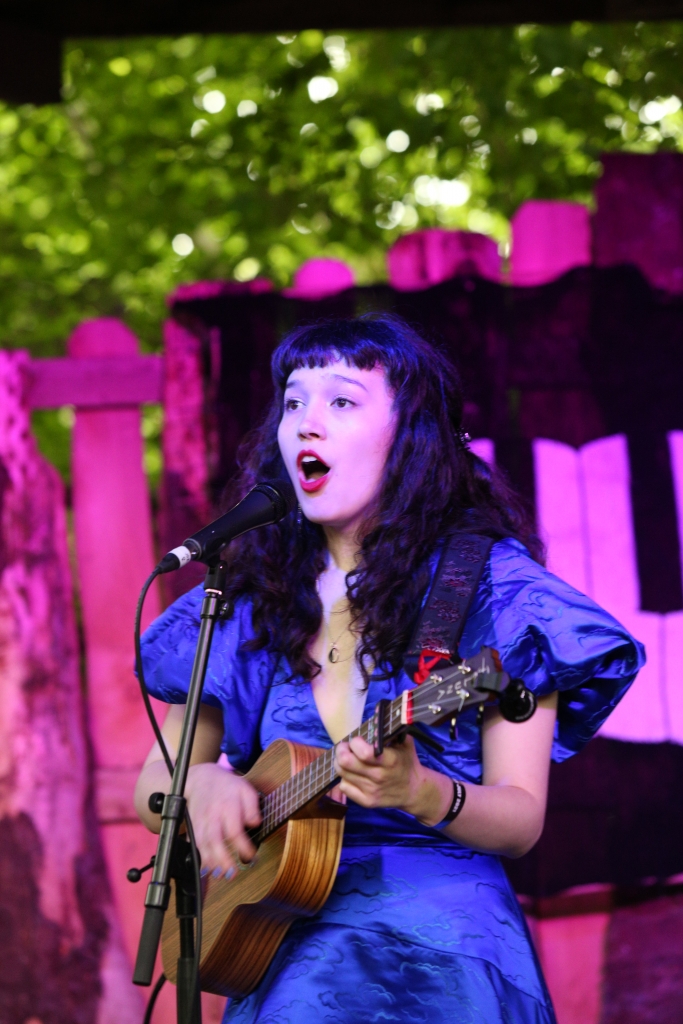 The new agenda is represented by ‘Always Back To You’ there is love and vindication and smiles. The sapphire costume catches the light and the wooden pilings around the stage make it look like a Rodgers and Hammerstein musical. Quite the achievement. Sasha says so long, farewell with her old fave, ‘Broken Vessels’, which already sounds like juvenilia. It’s moving along.
The new agenda is represented by ‘Always Back To You’ there is love and vindication and smiles. The sapphire costume catches the light and the wooden pilings around the stage make it look like a Rodgers and Hammerstein musical. Quite the achievement. Sasha says so long, farewell with her old fave, ‘Broken Vessels’, which already sounds like juvenilia. It’s moving along.
As with the Friday programme, there are occasional clashes between stage events. So we watch the start of Dani Larkin on the Stevie Martin Stage. It’s an important debut of the album and there are strings and percussion to accent the song-fables. ‘Aoife’ is all murmur and banjo and myth. Dani is reaching into the deeps of history to measure our own capacity for crowd-think and violence. Intense.
But we must also tramp down to Karma Valley for Jealous of the Birds, to hear ‘Blue Eyes’ exploding like a testy mattress. There’s a call-out to Kafka and Kurt and then a request for some whistling support for ‘Goji Berry Sunset’. How would you refuse the privilege? Naomi takes an aetheric steer with ‘The Grass Begins to Eat Itself’. She calls down poetry and delirium, murmurations and washing lines.
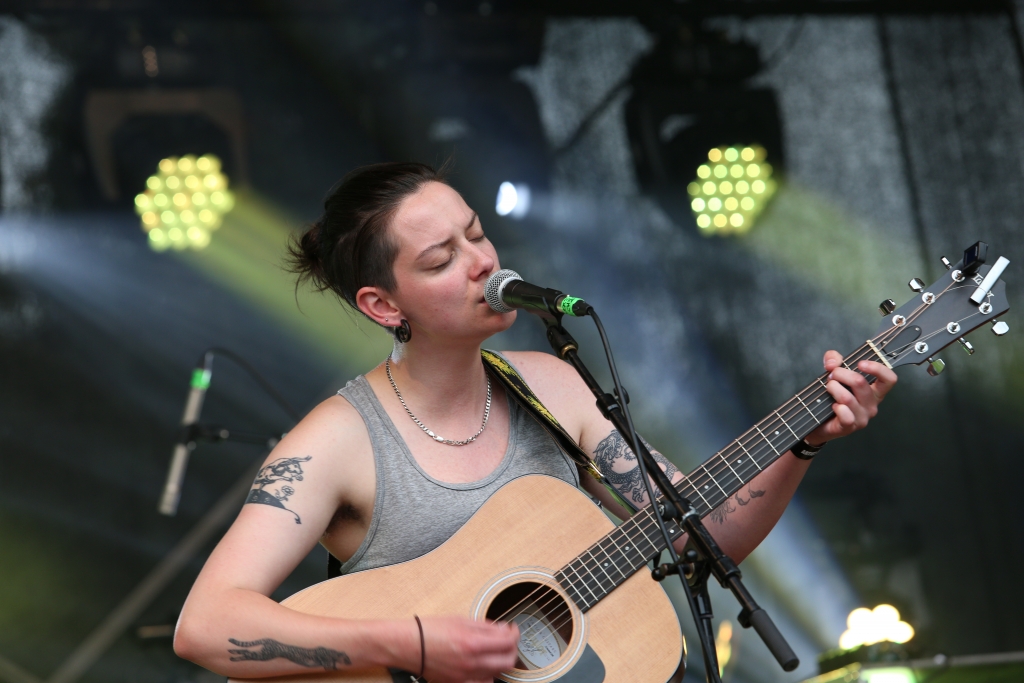 Cormac Neeson plays out from his White Feather record and a few tunes from The Answer. “Let’s just never leave here,” he figures. Nearby, Reevah is at the Henry McCullough stage with a coral blue Fender guitar, setting ‘Daydreamer’ free, a measure of sorrow and poise and spirit of Stevie Nicks.
Cormac Neeson plays out from his White Feather record and a few tunes from The Answer. “Let’s just never leave here,” he figures. Nearby, Reevah is at the Henry McCullough stage with a coral blue Fender guitar, setting ‘Daydreamer’ free, a measure of sorrow and poise and spirit of Stevie Nicks.
General Fiasco is a throwback to Glasgowbury Festival and four consecutive years up the Sperrins, 2007-10. For many here, the band was part of their summer rites and so there’s an orderly queue of baby buggies by the stage as the adults get their nostalgia. The songs have weathered decently and the time-coded message of ‘The Age You Start Losing Friends’ is sadly prescient.
Joshua Burnside was a low-key wow on the Friday bill but he gets his proper billing on the Saturday. At the risk of repeating ourselves let’s say that Josh is premium talent with bonus laughs, philosophy, ramshackle parts and endearing self-sabotage. He’s learnt to play the violin over lockdown and it’s a fun element in ‘Nothing for Ye’ – that mocking admission of the poor creative.
But hey, those songs. Allegorical and potent. Strange like old woodcuts. ‘War on Everything’ is fear and disturbance. ‘The Good Word’ is endlessly absorbing. The dream sequence when the robots are in the jungle is the greatest. For the second time in the weekend we hear ‘Whiskey Whiskey’ and the stomach flips, again.
And So I Watch you From Afar are the chosen ones to finish at the Karma Valley Stage. They have the credentials of punk, community, DIY and illuminating tunes. We watch them though the hazer clouds and magenta lighting. Rory looks back at us. A question: “we all made it ok?”
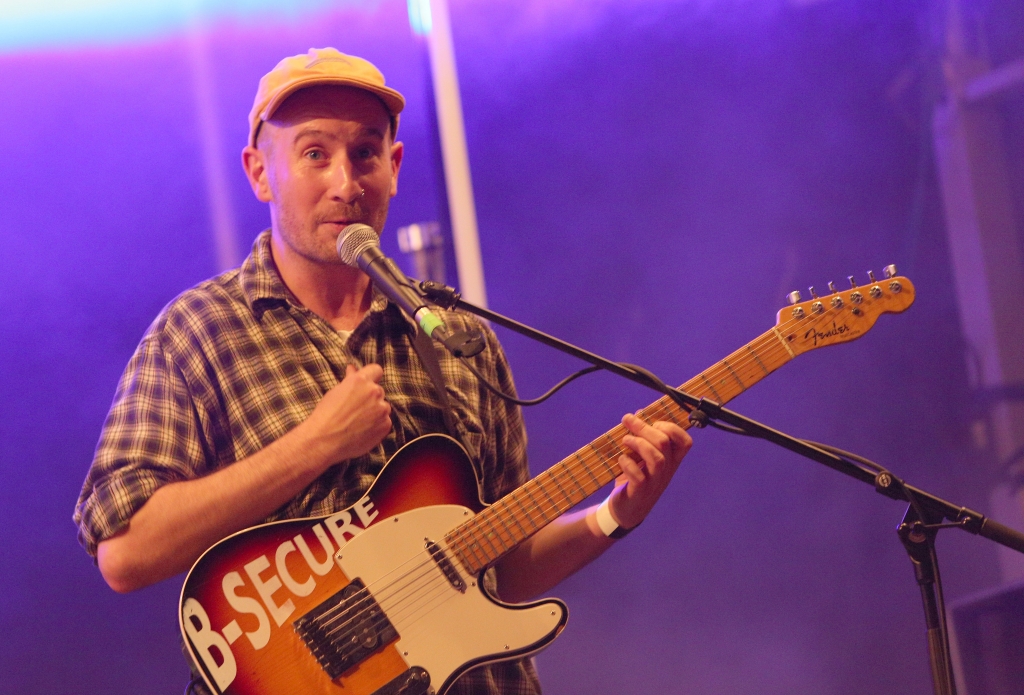 That’s a lot of stories and a lifetime of conversation. But we appreciate the sentiment. Rory has his own response, though. It hinges on two pieces. ‘A Little Bit of Solidarity Goes a Long Way’ is a reminder of how things were in 2008. The music scene was pulling together but the economic crash was imminent. The banking system was busting us yet music was holding firm, sustaining our hearts. And that tune will always be a guide to collective action and the affirming value of the arts.
That’s a lot of stories and a lifetime of conversation. But we appreciate the sentiment. Rory has his own response, though. It hinges on two pieces. ‘A Little Bit of Solidarity Goes a Long Way’ is a reminder of how things were in 2008. The music scene was pulling together but the economic crash was imminent. The banking system was busting us yet music was holding firm, sustaining our hearts. And that tune will always be a guide to collective action and the affirming value of the arts.
The stage lights go emerald and they play a new piece called ‘Years Ago’. Like ‘Solidarity’, it takes an emotional arc and tonight at least, it sounds like a bookmark to that earlier work. Two periods of difficulty, both affixed to significant music. ASIWYFA are thanking the Stendhal festival organisers, the stage crew and the people at Help Musicians NI who have done so much to uphold the local scene. They thank the audience also, because they have stayed true. Finally, they play ‘Big Thinks Do Remarkable’ and the lines sound reassuring. Darkness may yield. We’re beginning to see the light.
Stuart Bailie
All images by Stuart Bailie
Read the review of Stendhal Festival, Friday July 9 here.
 Colour us pink and consider us delighted. The sun is brilliantly over the Roe Valley, a few thousand people are steering into Stendhal Festival and here’s Joshua Burnside with Laura Quirke, singing so well. Is this a certifiable, pinch-me moment? We approach the Annan’s Arch stage as the music lifts and we think: yes, absolutely.
Colour us pink and consider us delighted. The sun is brilliantly over the Roe Valley, a few thousand people are steering into Stendhal Festival and here’s Joshua Burnside with Laura Quirke, singing so well. Is this a certifiable, pinch-me moment? We approach the Annan’s Arch stage as the music lifts and we think: yes, absolutely.
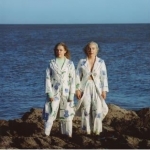 Morgan MacIntyre and Gemma Doherty, aka Saint Sister, are intentional in creating a palpably larger presence. Featuring more centrally across the board on their second release, both as protagonists in the album’s visuals and in self-producing the record, the duo meld their wistful ‘atmospop’ into groovier shapes on Where I Should End. Continue Reading…
Morgan MacIntyre and Gemma Doherty, aka Saint Sister, are intentional in creating a palpably larger presence. Featuring more centrally across the board on their second release, both as protagonists in the album’s visuals and in self-producing the record, the duo meld their wistful ‘atmospop’ into groovier shapes on Where I Should End. Continue Reading…
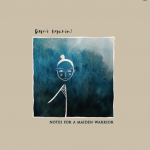 Dani Larkin’s debut record, Notes for a Maiden Warrior is an album in two halves. The first, based around the theme of the Warrior, represents the dark side of the moon. It explores the archetype of Ulster as the warrior province, home to Cú Chulainn and his superhuman abilities. Larkin reinterprets this image in her songs, presenting the warrior’s strength through reflection and resilience. The second half, Maiden, is sleepy and sincere. It plays with ideas of light and feminine energy, showing strength through vulnerability and a celebration of love and kindness. Notes for a Maiden Warrior draws on ancient, otherworldly tales as a study of tenderness, pain and learning. Continue Reading…
Dani Larkin’s debut record, Notes for a Maiden Warrior is an album in two halves. The first, based around the theme of the Warrior, represents the dark side of the moon. It explores the archetype of Ulster as the warrior province, home to Cú Chulainn and his superhuman abilities. Larkin reinterprets this image in her songs, presenting the warrior’s strength through reflection and resilience. The second half, Maiden, is sleepy and sincere. It plays with ideas of light and feminine energy, showing strength through vulnerability and a celebration of love and kindness. Notes for a Maiden Warrior draws on ancient, otherworldly tales as a study of tenderness, pain and learning. Continue Reading…







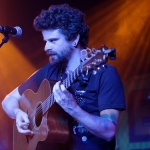




 Twitter
Twitter